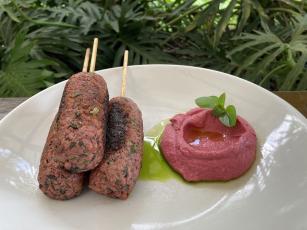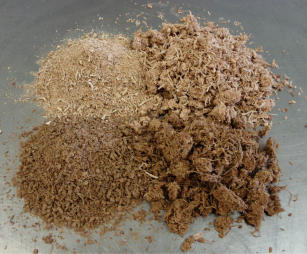Science has obtained products whose texture, flavor and appearance is very similiar to foods from animal sources. Formula includes Amazonian ingredients such as dehydrated Yanomami mushrooms babassu flour, and the indigenous pepper named assîsî. The recipes that the research developed are finished by chefs. At first, the products will be available in a few restaurants and steakhouses in Rio de Janeiro. Later on, they will be sold in the markets of several Brazilian states. Two new products made from plants are likely to shake the plant-based food market in Brazil. They are the Amazonika Kofta and the Amazonika Nuggets developed by the partnership between Embrapa Food Technology and Sottile Foods, which is now known as the new brand Amazonika Mundi, located in Niterói, RJ. The foods have characteristics that are similar to the ones from animal sources and, just like the Amazonika Burger and the Siriju crabcake (other results from this partnership), the new foods have cashew fiber in their composition. Another differential is the addition of ingredients from the Amazon rainforest that respect the principles of sustainability for the forest and native peoples, according to the food company. The Embrapa researcher Janice Lima reports that the challenge in the development of the kofta and nuggets was selecting ingredients that not only could meet the needs of the industry in terms of price and availability but would also mimic the sensory properties of texture, flavor and appearance of animal-based products. She recalls that nowadays there are several ingredients in the market aimed at the production of plant-based foods that are analogous to animal ones. The products were developed through the knowledge exchange between science and the industry “We have pinpointed pathways, suppliers and ingredients so that the manufacturer could obtain the desired product quality and characteristics. In the end, it is a win for all of us, Embrapa, Amazonika Mundi and consumers, for whom there will be products with differentiated quality available”, the scientist states. Use of cashew fiber strengthens smallholders in the Brazilian Northeast The Embrapa analyst André Dutra, who also participated in the formulation of the foods, underscores the contribution of research to the production chain of the ingredients they used, especially the cashew one. It benefits from the full use of the fruit, since the fiber is a co-product generated by processing the peduncle, from which the juice and the pulp are extracted. The industry's exploitation of the fiber adds an important value to the chain, increasing income for cashew smallholders. “Hence it strengthens both the circular economy to the benefit of environmental responsibility, and the solidarity economy, promoting social responsibility for cashew smallholders in the Brazilian Northeast”, Dutra asserts. Data from the Brazilian Institute of Geography and Statistics (IBGE) show that the Brazilian Northeast, the main cashew-producing region of the country, produced in 2018 approximately 747,000 tons of the peduncle, whose industrial use do not exceed 15% of the total according to unofficial estimates. Information from Embrapa Tropical Agroindustry also shows that the production of every one hundred kilos of cashew juice or pulp generates around 20 kilos of fiber, which is also called cashew bagasse. Photo: Janice Lima (cashew fiber) Because it is a special line, at first the products are being launched in selected restaurants and steakhouses in Rio de Janeiro. Amazonika Mundi's strategy is to encourage tastings at the restaurants. At a later stage, the idea is to sell them in the markets of several other Brazilian states, as it is done with the Amazonika Burger and the Siriju protein cakes, which were launched in 2019. “Our goal is to supply the affective memory of those consumers who are reducing their animal protein consumption and produce a sustainable food, with positive impact on the planet”, states one of the partners at Amazonika Mundi, Thiago Rosolem. Choice of ingredients provides flavor and nutricional qualityl Treated cashew fiber, developed from research by Embrapa Tropical Agroindustry, has neutral flavor and odor characteristics. In the recipes for the nuggets and for the kofta, it especially contributes to the products' texture and improved nutricional value with the added dietary fiber. According to Janice Lima, other ingredients were tested for the formulation of the savoury goods, such as textured protein, plant oils, and a binding ingredient to help molding. “In the end we included products whose color and flavor mimic the original animal-based products, such as the beetroot and the ingredients from the Amazon rainforest, which give them a special touch of flavor”, she reports. From the Amazon. we used dehydrated Yanomami mushrooms, babassu flour, and the indigenous pepper assîsî, all of which enrich the foods in terms of nutritional properties. After their development at Embrapa, the recipes are finished by chefs who give the foods a gourmet “touch”. A concern with sustainability The entrepreneur Cello Camolese, who is also a partner at Amazonika Mundi, undercores that one of the company's concerns is with sustainability. He stresses that resorting to reused ingredients like the cashew fiber is an important factor in this issue. “Moreover, we use ingredients produced by smallholders in the Brazilian North like babassu flour, Yanomami mushrooms and assîsi pepper, with guaranteed traceability and direct impact on Amazonian families, for instance”, Camolese reports, asserting that “the company establishes partnerships with the aim to develop the circular economy, the bioeconomy, transparency, and the traceability of the ingredients and the farmers”. According to him, Amazonika Mundi bets on the production of ingredients on a sustainable scale, because they believe that in the future Brazil will have a special place in the plant-based market. Photo: Kadijah Suleiman Information about where to find Amazonika Mundi's products Website: https://amazonikamundi.com.br/ Telephone: +55 21 3741-4013 e-mail: comercial@amazonikamundi.com.br
Photo: Kadijah Suleiman
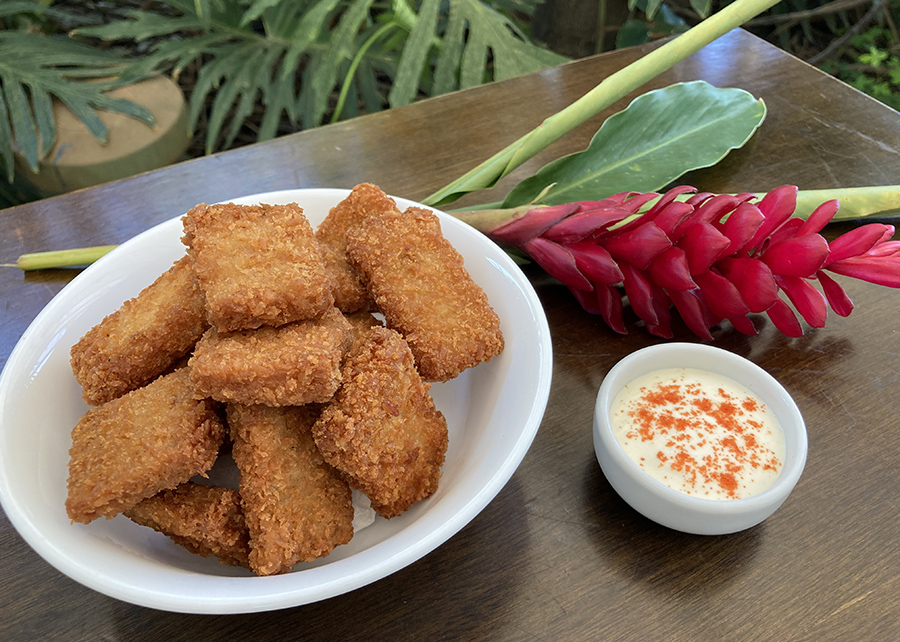
Products like the nuggets have been developed through the knowledge exchange between science and the industry
-
Science has obtained products whose texture, flavor and appearance is very similiar to foods from animal sources. -
Formula includes Amazonian ingredients such as dehydrated Yanomami mushrooms babassu flour, and the indigenous pepper named assîsî. -
The recipes that the research developed are finished by chefs. -
At first, the products will be available in a few restaurants and steakhouses in Rio de Janeiro. Later on, they will be sold in the markets of several Brazilian states. |
Two new products made from plants are likely to shake the plant-based food market in Brazil. They are the Amazonika Kofta and the Amazonika Nuggets developed by the partnership between Embrapa Food Technology and Sottile Foods, which is now known as the new brand Amazonika Mundi, located in Niterói, RJ. The foods have characteristics that are similar to the ones from animal sources and, just like the Amazonika Burger and the Siriju crabcake (other results from this partnership), the new foods have cashew fiber in their composition. Another differential is the addition of ingredients from the Amazon rainforest that respect the principles of sustainability for the forest and native peoples, according to the food company.
The Embrapa researcher Janice Lima reports that the challenge in the development of the kofta and nuggets was selecting ingredients that not only could meet the needs of the industry in terms of price and availability but would also mimic the sensory properties of texture, flavor and appearance of animal-based products. She recalls that nowadays there are several ingredients in the market aimed at the production of plant-based foods that are analogous to animal ones.
The products were developed through the knowledge exchange between science and the industry “We have pinpointed pathways, suppliers and ingredients so that the manufacturer could obtain the desired product quality and characteristics. In the end, it is a win for all of us, Embrapa, Amazonika Mundi and consumers, for whom there will be products with differentiated quality available”, the scientist states.
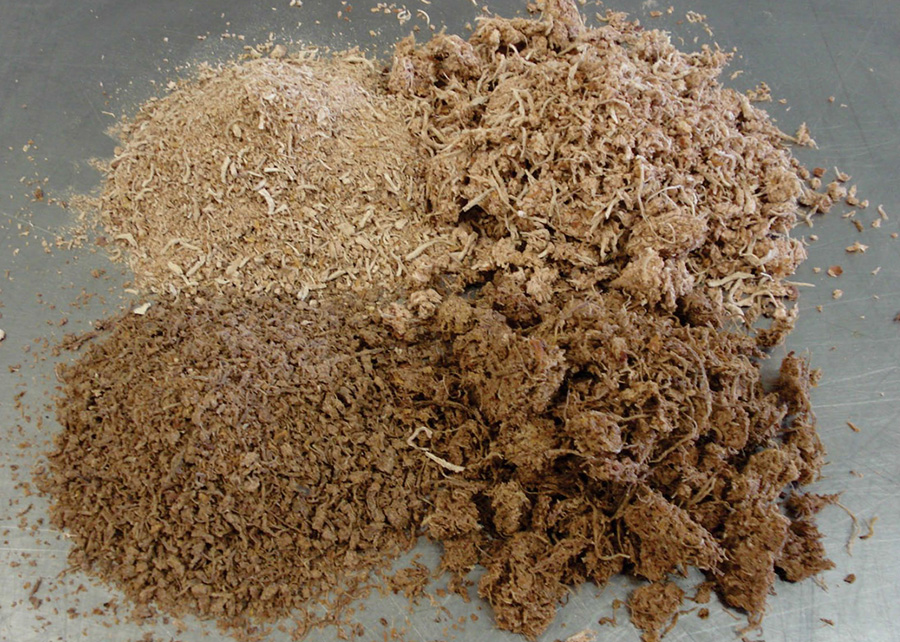 Use of cashew fiber strengthens smallholders in the Brazilian Northeast Use of cashew fiber strengthens smallholders in the Brazilian Northeast
The Embrapa analyst André Dutra, who also participated in the formulation of the foods, underscores the contribution of research to the production chain of the ingredients they used, especially the cashew one. It benefits from the full use of the fruit, since the fiber is a co-product generated by processing the peduncle, from which the juice and the pulp are extracted. The industry's exploitation of the fiber adds an important value to the chain, increasing income for cashew smallholders. “Hence it strengthens both the circular economy to the benefit of environmental responsibility, and the solidarity economy, promoting social responsibility for cashew smallholders in the Brazilian Northeast”, Dutra asserts. Data from the Brazilian Institute of Geography and Statistics (IBGE) show that the Brazilian Northeast, the main cashew-producing region of the country, produced in 2018 approximately 747,000 tons of the peduncle, whose industrial use do not exceed 15% of the total according to unofficial estimates. Information from Embrapa Tropical Agroindustry also shows that the production of every one hundred kilos of cashew juice or pulp generates around 20 kilos of fiber, which is also called cashew bagasse. Photo: Janice Lima (cashew fiber) |
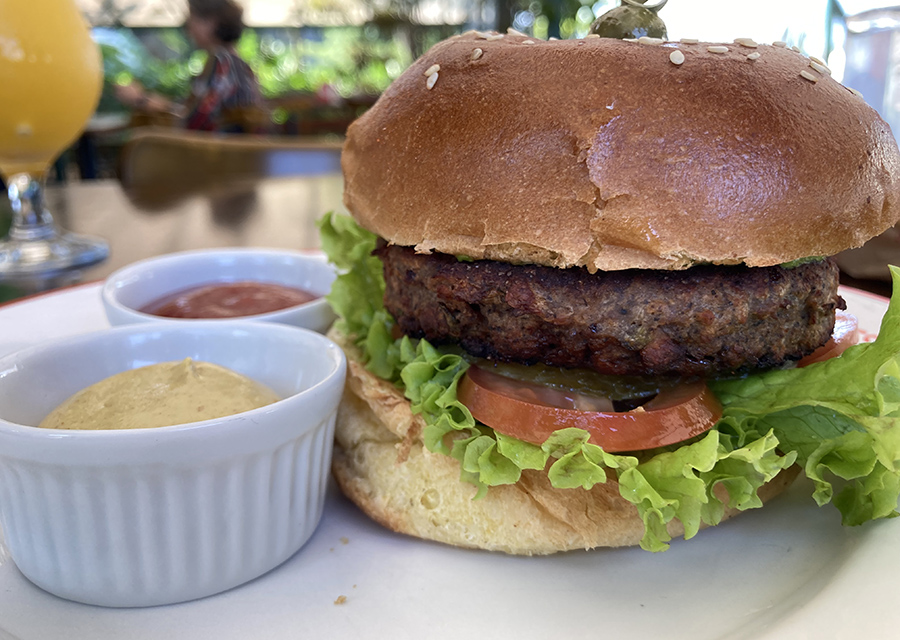
Because it is a special line, at first the products are being launched in selected restaurants and steakhouses in Rio de Janeiro. Amazonika Mundi's strategy is to encourage tastings at the restaurants. At a later stage, the idea is to sell them in the markets of several other Brazilian states, as it is done with the Amazonika Burger and the Siriju protein cakes, which were launched in 2019.
“Our goal is to supply the affective memory of those consumers who are reducing their animal protein consumption and produce a sustainable food, with positive impact on the planet”, states one of the partners at Amazonika Mundi, Thiago Rosolem.
Choice of ingredients provides flavor and nutricional qualityl
Treated cashew fiber, developed from research by Embrapa Tropical Agroindustry, has neutral flavor and odor characteristics. In the recipes for the nuggets and for the kofta, it especially contributes to the products' texture and improved nutricional value with the added dietary fiber.
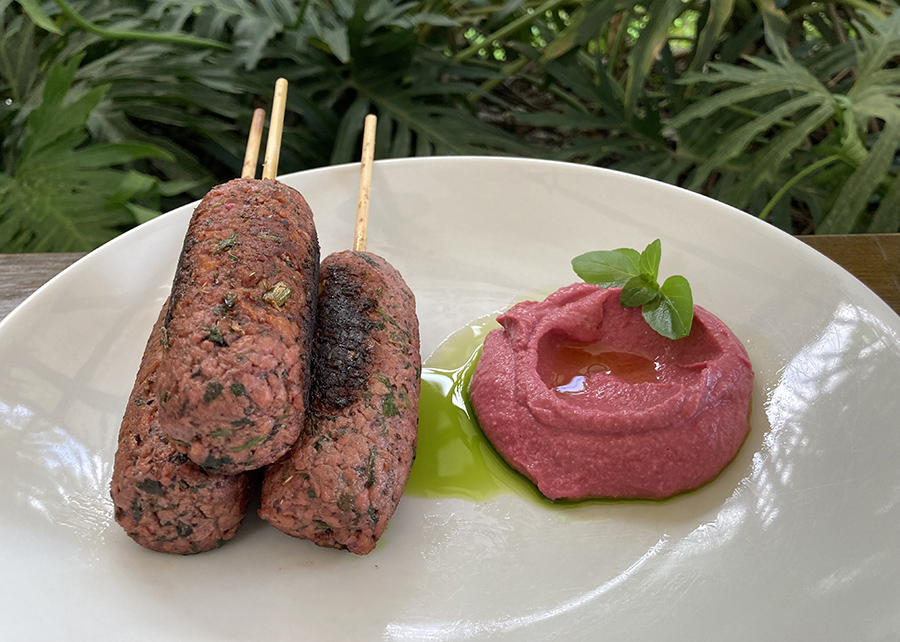
According to Janice Lima, other ingredients were tested for the formulation of the savoury goods, such as textured protein, plant oils, and a binding ingredient to help molding. “In the end we included products whose color and flavor mimic the original animal-based products, such as the beetroot and the ingredients from the Amazon rainforest, which give them a special touch of flavor”, she reports.
From the Amazon. we used dehydrated Yanomami mushrooms, babassu flour, and the indigenous pepper assîsî, all of which enrich the foods in terms of nutritional properties. After their development at Embrapa, the recipes are finished by chefs who give the foods a gourmet “touch”.
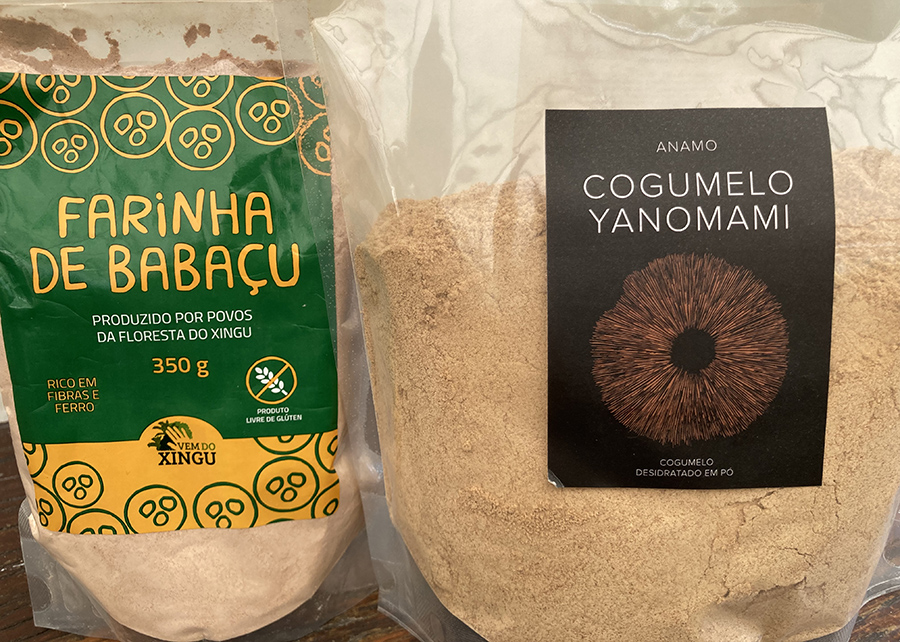 A concern with sustainability A concern with sustainability
The entrepreneur Cello Camolese, who is also a partner at Amazonika Mundi, undercores that one of the company's concerns is with sustainability. He stresses that resorting to reused ingredients like the cashew fiber is an important factor in this issue. “Moreover, we use ingredients produced by smallholders in the Brazilian North like babassu flour, Yanomami mushrooms and assîsi pepper, with guaranteed traceability and direct impact on Amazonian families, for instance”, Camolese reports, asserting that “the company establishes partnerships with the aim to develop the circular economy, the bioeconomy, transparency, and the traceability of the ingredients and the farmers”. According to him, Amazonika Mundi bets on the production of ingredients on a sustainable scale, because they believe that in the future Brazil will have a special place in the plant-based market. Photo: Kadijah Suleiman |
Information about where to find Amazonika Mundi's products
Website: https://amazonikamundi.com.br/
Telephone: +55 21 3741-4013
e-mail: comercial@amazonikamundi.com.br
Kadijah Suleiman (MTb 22.729/RJ)
Embrapa Food Technology
Press inquiries
agroindústria-de-alimentos.imprensa@embrapa.br
Mariana Medeiros - Translation (0013044/DF)
General Secretariat
Further information on the topic
Citizen Attention Service (SAC)
www.embrapa.br/contact-us/sac/



